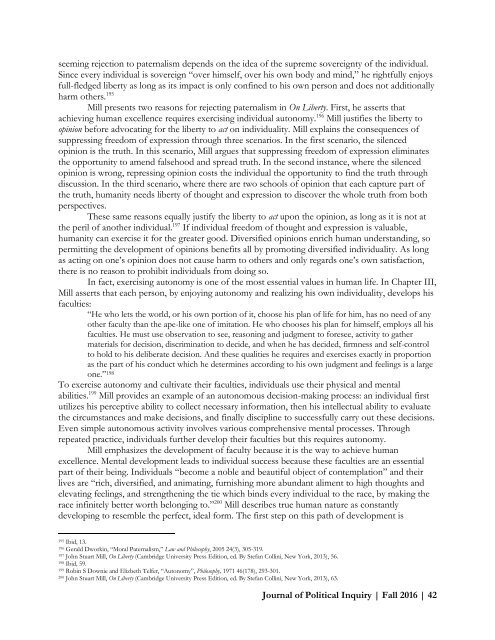Fall2016_Final
You also want an ePaper? Increase the reach of your titles
YUMPU automatically turns print PDFs into web optimized ePapers that Google loves.
seeming rejection to paternalism depends on the idea of the supreme sovereignty of the individual.<br />
Since every individual is sovereign “over himself, over his own body and mind,” he rightfully enjoys<br />
full-fledged liberty as long as its impact is only confined to his own person and does not additionally<br />
harm others. 195<br />
Mill presents two reasons for rejecting paternalism in On Liberty. First, he asserts that<br />
achieving human excellence requires exercising individual autonomy. 196 Mill justifies the liberty to<br />
opinion before advocating for the liberty to act on individuality. Mill explains the consequences of<br />
suppressing freedom of expression through three scenarios. In the first scenario, the silenced<br />
opinion is the truth. In this scenario, Mill argues that suppressing freedom of expression eliminates<br />
the opportunity to amend falsehood and spread truth. In the second instance, where the silenced<br />
opinion is wrong, repressing opinion costs the individual the opportunity to find the truth through<br />
discussion. In the third scenario, where there are two schools of opinion that each capture part of<br />
the truth, humanity needs liberty of thought and expression to discover the whole truth from both<br />
perspectives.<br />
These same reasons equally justify the liberty to act upon the opinion, as long as it is not at<br />
the peril of another individual. 197 If individual freedom of thought and expression is valuable,<br />
humanity can exercise it for the greater good. Diversified opinions enrich human understanding, so<br />
permitting the development of opinions benefits all by promoting diversified individuality. As long<br />
as acting on one’s opinion does not cause harm to others and only regards one’s own satisfaction,<br />
there is no reason to prohibit individuals from doing so.<br />
In fact, exercising autonomy is one of the most essential values in human life. In Chapter III,<br />
Mill asserts that each person, by enjoying autonomy and realizing his own individuality, develops his<br />
faculties:<br />
“He who lets the world, or his own portion of it, choose his plan of life for him, has no need of any<br />
other faculty than the ape-like one of imitation. He who chooses his plan for himself, employs all his<br />
faculties. He must use observation to see, reasoning and judgment to foresee, activity to gather<br />
materials for decision, discrimination to decide, and when he has decided, firmness and self-control<br />
to hold to his deliberate decision. And these qualities he requires and exercises exactly in proportion<br />
as the part of his conduct which he determines according to his own judgment and feelings is a large<br />
one.” 198<br />
To exercise autonomy and cultivate their faculties, individuals use their physical and mental<br />
abilities. 199 Mill provides an example of an autonomous decision-making process: an individual first<br />
utilizes his perceptive ability to collect necessary information, then his intellectual ability to evaluate<br />
the circumstances and make decisions, and finally discipline to successfully carry out these decisions.<br />
Even simple autonomous activity involves various comprehensive mental processes. Through<br />
repeated practice, individuals further develop their faculties but this requires autonomy.<br />
Mill emphasizes the development of faculty because it is the way to achieve human<br />
excellence. Mental development leads to individual success because these faculties are an essential<br />
part of their being. Individuals “become a noble and beautiful object of contemplation” and their<br />
lives are “rich, diversified, and animating, furnishing more abundant aliment to high thoughts and<br />
elevating feelings, and strengthening the tie which binds every individual to the race, by making the<br />
race infinitely better worth belonging to.” 200 Mill describes true human nature as constantly<br />
developing to resemble the perfect, ideal form. The first step on this path of development is<br />
195<br />
Ibid, 13.<br />
196<br />
Gerald Dworkin, “Moral Paternalism,” Law and Philosophy, 2005 24(3), 305-319.<br />
197<br />
John Stuart Mill, On Liberty (Cambridge University Press Edition, ed. By Stefan Collini, New York, 2013), 56.<br />
198<br />
Ibid, 59.<br />
199<br />
Robin S Downie and Elizbeth Telfer, “Autonomy”, Philosophy, 1971 46(178), 293-301.<br />
200<br />
John Stuart Mill, On Liberty (Cambridge University Press Edition, ed. By Stefan Collini, New York, 2013), 63.<br />
Journal of Political Inquiry | Fall 2016 | 42
















